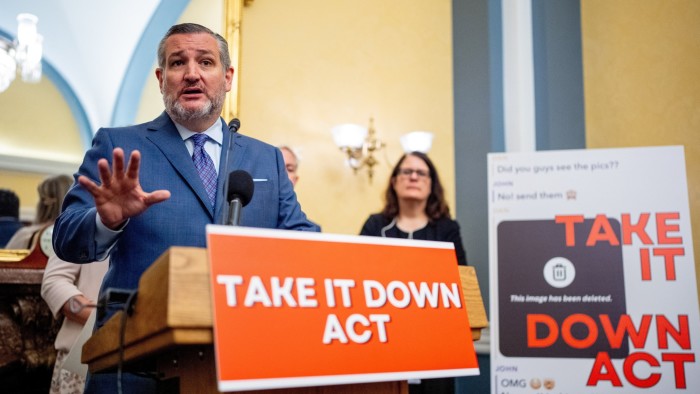Unlock the White House Watch newsletter for free
Your guide to what Trump’s second term means for Washington, business and the world
There was no mistaking the mood in the Senate room in Washington last Thursday as politicians and tech bosses debated artificial intelligence. The consensus was that it was essential for the US to deregulate and accelerate investment in order to outrun China in the latest technological arms race. Europe, meanwhile, was ridiculed as an AI also-ran having hobbled itself with “stifling” regulations.
Lobbing a softball to the tech executives, Republican Senator Ted Cruz asked: how harmful would it be if the US followed the EU in creating a heavy-handed regulatory process for AI? “I think that would be disastrous,” replied OpenAI’s chief executive, Sam Altman.
Deregulation and acceleration may be the watchwords in Washington after President Donald Trump tore up his predecessor’s sweeping executive order on AI. Republicans later trumpeted almost $1tn of promised investment in the sector. But that worldview is evidently not shared across the nation. Thirty-one US states passed resolutions or laws on AI last year, according to the National Conference of State Legislatures, covering harms, such as the use of deepfakes in elections, employment discrimination and lack of consumer protection. This year, the NCSL has flagged a further 550 AI-related bills that have been introduced in 45 states.
Most of these initiatives will fail, as happened to California’s landmark AI bill last year, but a few may well pass. Left unchecked, that could result in the US having “a web of inconsistent laws that fragment national policy, delay innovation, and create legal and technical barriers to scaling AI systems across state lines”, warns Daniel Castro, director of the Center for Data Innovation. When it comes to tech regulation, it seems, the US might end up more “European” than Europe.
That fear prompted House Republicans this week to push a legislative amendment that would roll back state AI laws and impose a moratorium on any new ones for a decade. The move was condemned by state representatives and the AI researcher Gary Marcus. “A decade of deregulation isn’t a path forward. It’s an abdication of responsibility,” they wrote in an open letter.
Opposition politicians also highlighted the hypocrisy of revering states’ rights when regulating women’s bodies but abandoning them when protecting consumers from powerful tech interests. An intense battle may now erupt between Washington and the states over who has the right to regulate — or deregulate — technology.
At the state level, there is “incredible momentum” to fill the regulatory vacuum created by Washington’s inaction, according to Amba Kak, executive director of the AI Now Institute. States are determined to tackle the most “abhorrent, harmful and problematic” use cases of AI, she says. “In today’s world, they’re the only people who can push this regulatory agenda forward. I think the states very much see a gap, and a moment, for them to step up to the plate,” she tells me.
However, fragmented AI-related state legislation affecting data privacy rights and autonomous cars, for example, can cause real complications for many companies. That is particularly true in some traditional sectors, such as financial services and medicine, that are wary of adopting AI services because of a lack of trust in untested AI systems and no clear mitigation, says Rumman Chowdhury, co-founder of non-profit Humane Intelligence and a former Biden administration official. “Regulation doesn’t stifle innovation. Regulation enables it,” she tells me, noting there is often a “trickle up” effect from the states to the federal level.
That suggests that the regulatory activism by states might yet force Washington to move, especially seeing that some members of the Maga crowd support a more interventionist approach. “Right now a nail salon in Washington DC has more regulations than these four guys running wild on AI. We have no earthly idea what is going on,” the former Trump aide Steve Bannon told the FT Weekend Festival in DC. “I think we ought to have tremendous regulations on AI.”
Even the anti-regulation evangelist Cruz accepts the necessity to act in certain cases. With the Democratic senator Amy Klobuchar, he co-sponsored the recent bipartisan Take It Down Act criminalising the sharing of AI-generated sexual abuse material. That legislation was also supported by first lady Melania Trump. There may be many strange alliances and unpredictable zigzags along the way, but regulation is coming for AI — even in the US.
